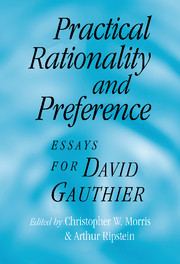Book contents
- Frontmatter
- Contents
- List of Contributors
- Practical Reason and Preference
- What Do Expressions of Preference Express?
- Preference
- Rational Temptation
- Bombs and Coconuts, or Rational Irrationality
- Are Intentions Reasons? And How Should We Cope with Incommensurable Values?
- Two Forms of Practical Generality
- Psychology for Cooperators
- Which Games Should Constrained Maximizers Play?
- The Strategy of Cooperation
- We Were Never in Paradise
The Strategy of Cooperation
Published online by Cambridge University Press: 11 January 2010
- Frontmatter
- Contents
- List of Contributors
- Practical Reason and Preference
- What Do Expressions of Preference Express?
- Preference
- Rational Temptation
- Bombs and Coconuts, or Rational Irrationality
- Are Intentions Reasons? And How Should We Cope with Incommensurable Values?
- Two Forms of Practical Generality
- Psychology for Cooperators
- Which Games Should Constrained Maximizers Play?
- The Strategy of Cooperation
- We Were Never in Paradise
Summary
Introduction
Starting with Adam Smith, and running like a bright thread throughout virtually all the subsequent theoretical literature on political economy, one can mark a preoccupation with the conditions under which public structures can emerge that will permit individuals to cooperatively transact with one another to their mutual advantage. The good news that there are in fact conditions under which such structures do emerge has to be tempered, however, by the bad news (1) that historical processes of institutional development tend to be path-dependent in ways that work against adaptive efficiency and (2) that virtually all institutional arrangements are subject to manipulation by special interests, to the short-term advantage of some, but often to the longterm disadvantage of all. Recent work in political economy has in fact identified deep pressures on human interaction that tend to prevent anything like the full realization of the mutual gains that cooperation can make possible. A truly optimal arrangement would seem, then, to be an ideal that is remote from social reality.
In one sense, there should be nothing surprising about this. After all, the historical record hardly supports any other picture. What is surprising, however, is that many of these conclusions are driven by models of ideally rational beings who have substantial and common knowledge of each other's rationality and preferences and the strategic structure of their interactions. On the accounts offered, Pareto-suboptimality does not flow just from assuming that some are less than fully rational, or possess limited or asymmetrical knowledge. Mutually disadvantageous free-riding and conflict over the distribution of goods are taken to be natural to the way in which even hyperrational and fully informed individuals interact.
- Type
- Chapter
- Information
- Practical Rationality and PreferenceEssays for David Gauthier, pp. 189 - 208Publisher: Cambridge University PressPrint publication year: 2001
- 2
- Cited by



